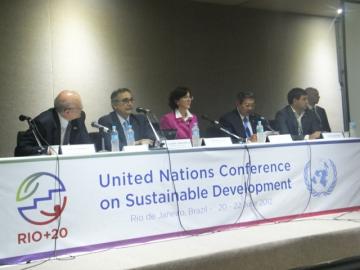
On 20-22 June 2012, the United Nations Conference on Sustainable Development (Rio+20) took place in Rio de Janeiro, capturing global attention and participation. Some 12,000 government and civil society representatives attended the conference, including heads of State and ministers from more than 190 countries. At the conclusion of Rio+20, the outcome document “The Future We Want” was approved and more than 700 pledges of financial support (totaling US$513 billion) were made. Led by Executive Secretary Rima Khalaf, ESCWA took an active part in Rio+20 and the third Preparatory Committee Meeting (13-15 June), during which the outcome document of the Conference was debated. “The Future We Want” reflects the will of the international community to maintain multilateral collaboration on sustainable development. Throughout the Conference, ESCWA closely monitored the deliberations and coordinated with Arab delegates as needed, to ensure that they drew maximum benefit from the event. In addition, ESCWA organized side events at Rio+20 with regional and international partners, including the other regional commissions of the United Nations. The work of the regional commissions has shown the unique value of a regional perspective in articulating a demand driven, holistic and multidisciplinary agenda for sustainable development. During the Conference, ESCWA participated in four major side events, namely: “Green Growth and Sustainable Development: Regional Perspectives”; “United Nations System: Together for the Future We Want”; “Food Security and Safety for Development in a Changing Arab World”; and “Advancing Sustainable Development in Post-Conflict and In-Transition Countries: The cases of Lebanon and Liberia”. The high-level panel on “Green Growth and Sustainable Development: Regional Perspectives” focused on the role of the regional commissions in shaping the green economy debate. The panel was moderated by the Executive Secretary of ESCWA, and keynote speakers included Prime Minister of Lebanon Najib Mikati; President of Indonesia Susilo Bambang Yudhoyono; Deputy Prime Minister of Moldova Mihai Moldovanu; and Minister for the Environment, Energy and Telecommunications of Costa Rica René Castro. The Executive Secretary spoke about the green economy and green jobs as a tool to counteract rising youth unemployment in the Arab region. The Executive Secretary of ESCWA also spoke at a high-level side event "United Nations System: Together for the Future We Want", organized by the United Nations System Chief Executives Board for Coordination and chaired by United Nations Secretary-General Ban Ki-moon. The Executive Secretary noted the role of the United Nations in empowering Arab youth, particularly in the wake of Arab Spring. She described recent uprisings as a wake-up call for the United Nations system, an opportunity to rethink what needs to be done and how to do it. "Food Security and Safety for Development in a Changing Arab World" was organized by ESCWA, the League of Arab States, the Deutsche Gesellschaft für Internationale Zusammenarbeit (GIZ), the Arab Forum for Environment and Development (AFED), the Arab Network for Environment and Development (RAED). The event emphasized the need for carefully designed policies and related programmes. The event featured a short video on food security and safety from the perspective of Arab youth. In collaboration with the United Nations Department of Economic and Social Affairs (UN-DESA), the United Nations Development Programme (UNDP) and the United Nations Centre for Regional Development (UNCRD), ESCWA organized a side event on “Advancing Sustainable Development in Post-Conflict and In-Transition Countries: The cases of Lebanon and Liberia”. During Rio+20, the Executive Secretary of ESCWA briefed high-level delegates including the Prime Minister of Morocco, the Prime Minister of Lebanon and the Palestinian Minister of Foreign Affairs on the Commission’s latest developments, its programmed activities and plans for strengthening cooperation with member countries. Furthermore, ESCWA provided delegates and participants with information, schedules of events, updates and tips for navigating the 500 official and nearly 3,000 unofficial side events at the Conference. From the first day of Rio+20, the Commission’s office at the Conference Pavilion was an oft-visited meeting point and resource center for member countries. In support of its Green Productive Sectors project, ESCWA sponsored the attendance of project focal points at Rio+20, to build their capacity in Green Economy policies and tools. Their active participation in the Conference and commitment to sustainable development is expected to enhance the quality and deliverables of the Green Productive Sectors project. Rio+20 marked the culmination of the regional preparatory process that ESCWA coordinated over the past two years. The process resulted in a harmonized Arab position on the themes of the Conference and ensured that the voices of ESCWA member countries were heard at this important event. This was accomplished through significant achievements including the Arab Ministerial Declaration on Rio+20 (April 2012) and the ESCWA resolution on the follow-up to Rio+20 (May 2012). Now that Rio+20 has come to a successful conclusion, ESCWA must continue to build appropriate development agendas that reflect the outcome of the Conference and meet the needs and expectations of all who have put their faith and trust in the Commission.(To be continued)





